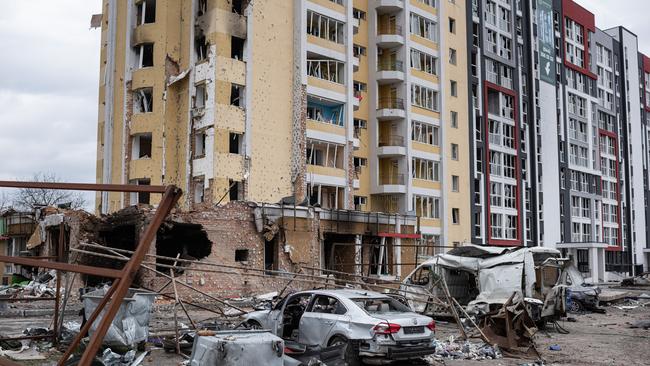Exiting Russia easier said than done for investors
Investors want to avoid losses – and to penalise the Putin regime – but up to 90 per cent of pre-war Australian funds remain locked inside Russia.

Investors hoping to get their money back on their Russian investments must now face a grim reality: They are now holding what institutional funds like to describe as “stranded assets”.
For most investors, the damage has been restricted to the margins. The nation’s biggest super funds, managed funds and ETFs have only a small direct exposure to Russia.
Still, the Financial Service Council this week was prompted to release guidance to help super investors and fund managers on how to deal with divesting their Russian assets. It will not be easy.
Indeed, hundreds of millions of dollars are now being written off by the country’s biggest investors, among them the major retirement funds, as the extended suspension of Moscow’s stock exchange – currently only partially open to domestic traders – forces investors to hold on to these now worthless assets.
The nation’s largest superannuation fund, the $260bn AustralianSuper, has already written off its close to $200m Russian holdings.
The industry fund in last month confirmed plans to divest its holdings in Russia “as markets permit”.
But it faced the same issue as any investor: with Moscow’s exchange suspended from February 25, the fund has had to writedown the investments – around $182m as of March 4 – to zero. Last June, its holdings in the country accounted for 0.22 per cent, or $572m, of its total assets.
But as recently as December 31, AustralianSuper still had hundreds of millions invested in the country.
At least $336m of its balanced option funds was invested in Russia’s listed companies, according to its latest portfolio disclosure.
This included $120m in Russia’s largest lender, the majority state-owned financial services group Sberbank. In local currency terms the value of that investment fell more than 50 per cent on February 25, when Moscow halted all trade.
Russia had actually been an outperformer prior to its invasion of Ukraine. The Morningstar Russia Net Return Index returned 28.6 per cent in Australian dollars for the 12 months to January 31, well in excess of the 1 per cent return eked out by the MSCI Emerging Markets Index over the same period.
The strong performance was driven by its leverage to oil, gas and commodities, according to Morningstar: that all changed in February. In a single day, Russia’s stockmarket plunged 33 per cent. Moscow’s invasion of Ukraine was met with crushing Western sanctions and a swift collapse in the rouble, as investors fled for safety.
The $252bn Future Fund, moved to sell down its Russian holdings the same day of the invasion. The fund held around $200m in companies listed on the moscow stock exchange at the time and said it would wind down its exposure “as market conditions permit”.
More than a month later, it has offloaded just $20m of those assets.
“Sanctions on Russia and the closure of the Moscow stock exchange have hampered every investor’s efforts to sell,” CEO Raphael Arndt said this week.
“We have reduced our holdings from over $200m to around $180m – less than 0.1 per cent of the fund – and intend to wind down the holdings as market conditions allow.”
The fund has no holdings in Russian sovereign debt or other fixed income and it has not yet written the investment down to zero.
Russia-focused exchange-traded funds, including the iShares MSCI Russia ETF (ERUS), which trades in the US, have also taken big hits.
While trade in Russia’s stockmarket was suspended from late February, investors could still sell ERUS until March 4. At the start of the year the units were trading at $US43 but by early March they had plunged to $8.
With MSCI and other index providers removing Russian stocks from their benchmarks and effectively pricing Russian securities to near zero, BlackRock’s ETF manager iShares has followed suit, writing down the value of the holdings to near zero.
On the ASX, the iShares emerging markets IEM ETF had a 2.65 per cent exposure to Russia’s biggest companies before the crisis unfolded. This has also been written down.
“We will continue consulting with regulators, index providers and other market participants to help ensure our clients can exit their positions in Russian securities, whenever and wherever regulatory and market conditions allow,” a BlackRock spokesperson told The Australian.
Likewise, the Vanguard FTSE Emerging Markets shares ETF had a 3 per cent exposure to Russia at December 31. By March 8 that was listed as zero.
The war has shown how quick investors now shun investments on ethical grounds, trumping even the financial return impact. Ethical investment adviser Nathan Fradley said most funds were quick to divest once tensions erupted.
“We even saw Vanguard move quickly. They had Russia within their emerging markets funds and they pulled them straight out. A lot of work was done by product providers,” Mr Fradley said.
“The ethical dilemma now is we’ve got a situation where we’re treating Russians in the same way we treat Russia. We’re putting them all in a basket and that’s the conversation I’m having with some of my clients. They want to make sure they’re not financing the war but they’re also acutely aware of the impact on local Russians.”
Still, some appear to be waiting it out. WA fund manager Packer & Co had a 20.7 per cent exposure to Russia in its Investigator Trust portfolio at December 31, counting Russian gas giant Gazprom as its largest holding. That investment has now lost a chunk of its value, but the fund has made no public on its intentions.




To join the conversation, please log in. Don't have an account? Register
Join the conversation, you are commenting as Logout